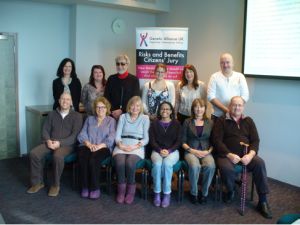Carl Herbort and Marina Papadia from the Centre for Ophthalmic Specialised Care in Lausanne, Switzerland analysed the cases of Birdshot seen at the centre between 1995 and 2010. These cases included people who had no specific diagnosis on referral, because they did not have the typical ‘birdshot lesions’, although they were HLA A29 positive. These patients did have vitritis and retinal vasculitis (this is as a result of the inflammation, and to us Birdshotters presents as the floaters and ‘mist’ and other symptoms we have).
When these people were given ICG (Indocyanine Green Angiography) they were shown to have ‘bilateral evenly distributed choroidal hypofluorescent dark dots representing choroidal granulomas’.
The conclusion of this retrospective analysis is that ICG is an essential tool to diagnose early Birdshot.
This is a really interesting piece of research for me – I first presented without the typical Birdshot spots/lesions – but I was lucky to come across an amazing ophthalmologist who diagnosed me in record time (and did give me an ICG!) and got me onto appropriate medication in record time. I still have very few of those characteristic spots/lesions, 7 years into the disease!
The full article can be accessed at: http://www.ncbi.nlm.nih.gov/pubmed/22496001
Rea

